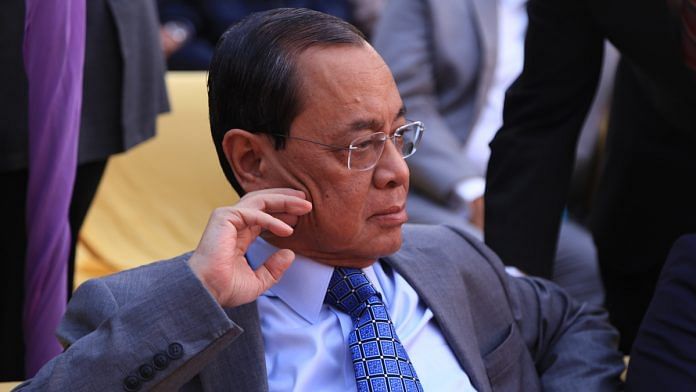New Delhi: The Central Information Commission (CIC) has rejected a plea seeking access to the report of a Supreme Court (SC) in-house inquiry concerning the sexual harassment complaint filed by a former court staffer against former Chief Justice of India (CJI) Ranjan Gogoi.
The applicant in the case, Ramesh Chidambaram, had moved the CIC after his request to get a copy of the report under the Right to Information Act (RTI) was turned down by the SC registry. The report in May 2019 had absolved the former CJI of the sexual harassment charges.
However, its contents have not been made public, with the inquiry panel citing a 2003 Supreme Court judgment and claiming that the ruling judicially prohibits disclosure of such inquiry committee reports. The SC registry had cited the same judgment in its response to Chidambaram.
The CIC in its 30 November order, accessed by ThePrint, also relied on the 2003 SC verdict to hold that Chidambaram did not have the right to access the report of the in-house committee. Citing the Right to Privacy, Chief Information Commissioner Y.K. Sinha held that the SC decision applied to the present case, affirming the SC registry’s view that the information sought was “confidential” and “sub-judice”.
Also read: ‘Was a mistake’: Ex-CJI Gogoi on being on bench hearing sexual harassment case against him
Previous decisions inapplicable: Appellant
In his appeal before the CIC, Chidambaram had argued that the 2003 decision (Indira Jaising vs Registrar General, Supreme Court) could not be applied to adjudicate his application as that judgment was pronounced before the enactment of the RTI Act in 2005, and the “nature” of information in both cases was different.
In the Jaising case, the Supreme Court dealt with a similar inquiry report concerning allegations against sitting judges of the Karnataka High Court. The top court had said that such information was of an “exceptional category” due to its preliminary and confidential nature, protecting it from disclosure.
Chidambaram had approached the CIC after his request to the SC’s public information officer, and then his first appeal seeking disclosure of the committee’s report, were dismissed.
No locus, confidential and protected: Supreme Court PIO
The Supreme Court’s public information office (PIO) opposed the appellant’s plea and maintained that he had no right to access such information as he lacked the requisite locus standi (right to approach the court in the matter) to demand it.
The PIO’s lawyer, Swarupama Chaturvedi, also submitted that the employer in this case was exempted from disclosing the information as it is held in a fiduciary (trust) capacity.
It was further contended that such personal information was protected from unwarranted invasion of privacy and there was no “larger public interest” that could justify disclosure of the information sought.
Lastly, it was argued that the decision in the Jaising case was relevant and applicable, as it was “in pari materia (on the same subject)” as the present case.
Law ‘well settled’, ‘Right to Privacy’
Apart from drawing references from the 2003 decision, the chief information commissioner in his order also took note of a 2011 decision of the apex court where it was held that a ‘fiduciary relationship’ includes a duty of non-disclosure to third parties.
The commission noted that in denying the report to Chidambaram, the SC PIO had balanced the “right to know” with the “Right to Privacy”.
“This exposition of the court equally reconciles the right to know with the rights to privacy under clause (j) to Section 8(1) of the RTI Act. Clearly the appellant [Mr Ramesh Chidambaram] in this case is not the beneficiary in whose benefit the information is held by the respondent [registry of the Supreme Court of India],” the commission said in its order.
Terming the law relating to disclosure of such reports “well settled”, the commission dismissed the appeal.
This decision by the commission remains applicable and binding unless it is appealed in the Supreme Court or a high court.
Akshat Jain, a first-year student of law at NLU, Delhi, is an intern with ThePrint
(Edited by Rohan Manoj)
Also read: In 15 years, RTI has gone from Indian citizens’ most powerful tool to an Act on life support



